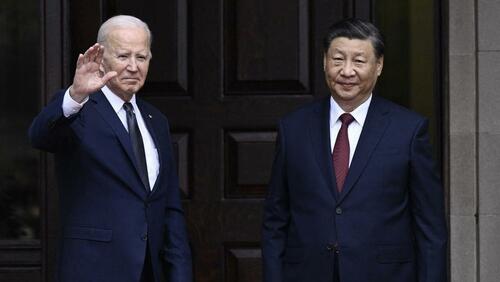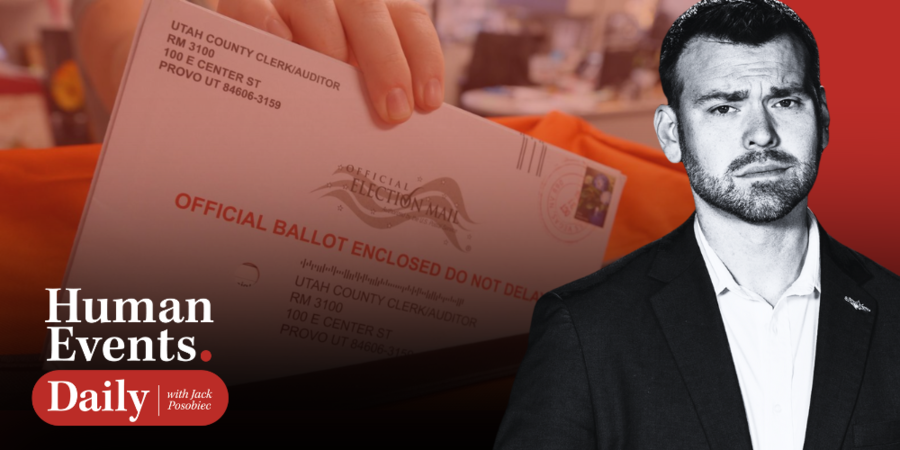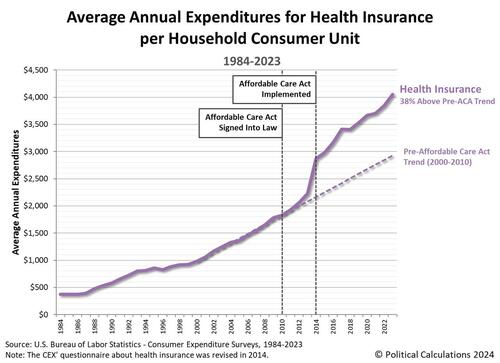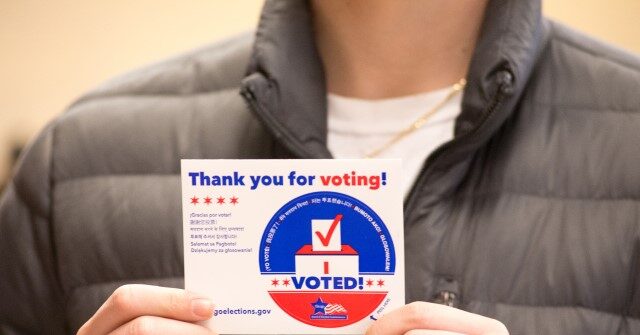America’s National Security Is Far Worse Off Than Four Years Ago
America’s National Security Is Far Worse Off Than Four Years Ago
Authored by James E. Fanell and Bradley A. Thayer via American Greatness,
Ronald Reagan’s query to the American people in his October 28, 1980, debate with incumbent President Jimmy Carter was so simple and so devastating that it is still employed today: “Are you better off than you were four years ago?” While most Americans are far worse off today than they were four years ago, with rising prices, inflation, a hollow economy, and unchecked immigration, so too are the U.S., its allies, and its partner’s national security interests, which are far worse off than they were four years ago.
Four years ago, there was stability in Europe, the Middle East, and the Indo-Pacific. Now Europe’s “long peace,” that is, no major war in Europe since 1945, has been shattered by Russia’s horrific invasion of Ukraine. This war has resulted in the deaths of over one million humans and the displacement of millions more. The Middle East is roiling with conflict due to Hamas’ October 7, 2023, unprovoked attack on Israel and its consequences—the Iranian-backed Houthis interdiction of international shipping in the Gulf of Aden and the Red Sea, the attacks from Hezbollah in Lebanon and ultimately unprecedented attacks from Iran against Israel with drones and missiles. The Indo-Pacific is rife with unrest principally due to the People’s Republic of China’s (PRC) hyper-aggression against key U.S. allies and partners like India, Japan, the Philippines, and Taiwan, and against the American people themselves.
The cause of this instability is the Biden-Harris administration’s ideological obsession to “manage America’s decline” and the subsequent policies they adopted in the last almost four years. The Biden-Harris administration failed to deter the Russian invasion of Ukraine in February 2022. This war is a humanitarian nightmare for all concerned; it is a stalemated conventional conflict, evincing an intensity of combat not seen in Europe since 1945. The war also entails the risk of nuclear escalation, the tremendous cost of which the U.S. and its NATO allies would not escape. In addition, this administration has fundamentally failed to support Israel by not holding Iran to account—even worse by providing Tehran the funding to expand their terrorism against Americans.
However, in the pantheon of Biden’s failures, it is towards the PRC that the Biden administration has made its greatest foreign policy fiascos. The Biden-Harris administration has continued the failed “Engagement” policies with the PRC that have aided the Chinese Communist Party (CCP) at a time of great peril. The Biden-Harris administration ignores the existential nature of the CCP threat because it seeks to continue the Engagement school of thought through what we call the Biden-Harris administration’s “neo-Engagement” policy.
With the exception of the Trump presidency, Engagement has been the dominant U.S. approach to the PRC since Bill Clinton. It asserts that the PRC is not an existential threat to the U.S. Far from it—the Engagement school contends the Sino-American relationship should be cooperative. Any troubles may be addressed by more cooperation with the PRC and accommodation of the interests of the CCP to sustain that cooperation. In essence, the Engagers are appeasers. Unfortunately, their arguments are ubiquitous and dominate U.S. foreign policy toward the PRC. Engagement dominates Wall Street, foundations, think tanks, universities, media, Silicon Valley, K Street, major law firms, and government. Even after the fiasco of allowing a PRC intelligence, surveillance, and reconnaissance balloon to fly over the entirety of America and the conga line of Biden-Harris cabinet officials traveling to Beijing to kowtow before Xi Jinping, the nadir was the November 2023 meeting between Biden and Xi near San Francisco. Beyond the obsession by Biden-Harris to resume military-to-military exchanges despite the People’s Liberation Army’s increased threatening behavior, 400 of America’s richest business leaders attended a dinner with the PRC’s dictator—Xi Jinping. These “titans” of America’s economy gave the CCP dictator two standing ovations while Xi explained his vision of tyranny—on American soil—and how the American business elite could help him sustain it.
The failed Biden-Harris neo-Engagement policies have allowed the CCP to escape the costs of its many decades of misrule but also provided the window for the CCP’s hyper-aggression over the last four years. Since assuming office, the Biden-Harris administration has overseen and done nothing as the PRC built over 300 nuclear Intercontinental Ballistic Missiles (ICBM) silos in central and western China, upgraded the submarine-launched ballistic missiles (SLBM) aboard their sea-based leg of their triad, expanded their ballistic missile submarine production facilities, and introduced a new nuclear bomber, the H-20. This aircraft very closely resembles the B-2 stealth bomber. Additionally, the Biden-Harris regime has sat by as PLA Air Force H-6 bombers have for the first time flown nuclear bomber profiles with their Russian Long Range Aviation counterparts into the Alaskan Air Defense Identification zone.
By every metric, the CCP is flexing its strategic muscles by expanding its nuclear arsenal and strategic reach. The PRC continues to agress relentlessly against U.S. national security interests. While the pace of their aggression is quickening, the Biden-Harris administration is cutting the size of the Department of Defense. For example, Biden-Harris continues to decommission more warships than it builds, as demonstrated by their Fiscal Year 2025 budget that procures just six warships, the lowest number of any budget submission since 2006.
This degradation of America’s maritime power is especially pernicious as the situation in the South China Sea, near Scarborough Shoal or Sabina Shoal, is dramatically worsening. Likewise, the PLA is increasing its pressure on Taiwan through unceasing operations to prepare for an invasion. In the past month, the PLAAF violated Japanese territorial waters for the first time ever. Moreover, the PLAN and Russian Navy sailed into the Gulf of Alaska, while it has been confirmed that PLA is supplying Russia with military weapons to aid Moscow in its war against Kyiv. There are also credible reports, including from the South Korean Minister of Defense, that the North Koreans are directly aiding the Russian war effort.
In his famous debate with Carter, Reagan also asked Americans if they believed America was as respected and whether America was as strong as four years ago. Once again, the answer to that question today is no. America was far more respected by its foes and was stronger four years ago than today. America was seen by its key allies in Europe, the Middle East, and the Indo-Pacific as a far better, more reliable, and more confident ally than today. The result is that a Harris presidency would continue these neo-Engagement policies to embolden enemies and continue to punish allies and partners. Only a Trump presidency will end failed policies of neo-Engagement and return the U.S. to the Reaganesque certainty of the previous Cold War that “the U.S. wins, the CCP loses.”
***
James E. Fanell and Bradley A. Thayer are authors of Embracing Communist China: America’s Greatest Strategic Failure. The views expressed are their own.
Tyler Durden
Fri, 10/18/2024 – 23:25
Trump Campaigns in MI with Arab American Mayor Who Endorsed Him
Former President Donald Trump campaigned in Michigan on Friday with the Arab American mayor who previously endorsed him.
The post Trump Campaigns in Michigan with Arab American Mayor Who Endorsed Him appeared first on Breitbart.
Trump on Claims He’s ‘Exhausted’: Harris ‘Didn’t’ Go to Al Smith Dinner
Former President Donald Trump responded to claims that he was “exhausted” and canceling events, pointing out that Vice President Kamala Harris “didn’t” attend the Al Smith dinner on Thursday night.
The post Trump Slams Kamala Harris Over Claims He’s ‘Exhausted’: ‘She Didn’t’ Come to Al Smith Dinner appeared first on Breitbart.
US budget deficit widens to $1.8 tn, third highest on record
The United States on Friday reported a budget deficit of $1.8 trillion for the past year, widening from 2023’s level on greater spending, including for interest on the public debt. The overall deficit expanded by $138 billion for the year ending September 30, said the Treasury Department. The nation’s debt remains a key concern for […]
The post US budget deficit widens to $1.8 tn, third highest on record appeared first on Insider Paper.
Philippine police on manhunt for gang of armed men who allegedly kidnapped an American YouTuber from a remote village
Police identified the victim, who was shot in the leg by the armed gang dressed in all black and whisked away in a speedboat, as 26-year-old Elliot Onil Eastman from Vermont.
JACK POSOBIEC: ‘Bully the vote’
“President Trump isn’t running against Kamala Harris. He’s running against a regime. He’s running against the elites, and that’s why all of us need to be hard-nosed and steely-eyed.”
Oh, ‘Bamacare! Visualizing Forty Years Of Health Insurance Cost Inflation
Oh, ‘Bamacare! Visualizing Forty Years Of Health Insurance Cost Inflation
The Consumer Expenditure Survey (CEX) now covers forty years worth of data for how Americans households spend money.
That data includes how much the average “consumer unit” surveyed by the U.S. Census Bureau spends on health insurance, which like many other things in the economy, has seen significant cost inflation over the past four decades.
The following chart, via Political Calculations blog, shows how that cost has changed from 1984, the first year for the CEX, through 2023, the latest, whose data was just released last month.
As you’ll see, over the past 40 years, there has been one major factor that has altered the trajectory for how much American households/consumer units pay on average for health insurance coverage.
Back in 1984, the first year for the CEX, American household consumer units paid an average of $370 for health insurance.
That figure grew steadily over the following years and by 2000, the average cost of health insurance for a U.S. household has risen to $980.
From 2000 through 2010, the average cost of health insurance grew faster, reaching $1,826 by 2010.
Had the 2000 through 2010 growth trend continued, we estimate the average amount American households would pay for health insurance in 2023 would be $2,927.
But it didn’t, thanks to the passage of the Affordable Care Act, which was signed into law in 2010.
It was implemented over several years, going into full effect in 2014.
The claimed goal of the law, as suggested by its name, was to make health insurance more affordable for Americans.
In 2023, the average cost of health insurance paid by American households has more than doubled what it was in 2010.
At an average $4,049 per household, this expense is more than 38% higher than the trend that existed in the decade before the Affordable Care Act became law.
The chart also indicates the cost “curve” for health insurance has bent upward since 2021, which has inflated more quickly over the last few years following 2020’s coronavirus pandemic.
Tyler Durden
Fri, 10/18/2024 – 18:00
UK man, Mohamed Noor Iidow, convicted of manslaughter after orally raping mother of 3 to death
37-year-old Natalie Shotter was also an NHS worker.
Proof, DNA contamination report
Summary of my interview with analytical virologist Dr. David J. Speicher,
Substack: https://drdavidjspeicher.substack.com/
GiveSendGo: https://drdavidjspeicher.substack.com/p/launching-my-give-send-go-campaign
Kevin’s Substack: https://anandamide.substack.com/p/vaccine-targeted-qpcr-of-cancer-cell?utm_source=profile&utm_medium=reader2
Report from Canadian virologist, Dr. David Speicher
https://www.dropbox.com/scl/fi/sb20elb520v6a1saxg9lj/240909-D-Speicher-Report.pdf?rlkey=dutcvd85gh80ebfs2ucdmorba&e=3&st=0jpsw84f&dl=0
Maria Gutschi: https://mariagutschi.substack.com/
Exclusive–RNC Chairman: Low Propensity Voter Turnout Higher Than Usual
The Republican National Committee (RNC) is focusing on “low propensity voters,” and the figures are already “dramatically higher” than normal.
The post Exclusive — RNC Chairman Michael Whatley: Low Propensity Voter Turnout ‘Dramatically Higher’ than Usual appeared first on Breitbart.
















